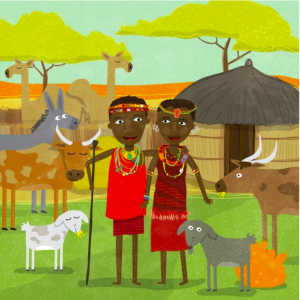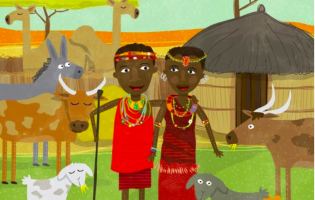‘Language was the most important vehicle through which that power fascinated and held the soul prisoner. The bullet was the means of the physical subjugation. Language was the means of the spiritual subjugation.’ Ngugi wa Thiong’o – Decolonising the Mind (9)
This upcoming post is part of a two series blog post which will focus on language, and how decolonisation is being enacted through focusing on indigenous languages, and the ICT initiatives facilitating these. This first post will feature the value of indigenous languages in rural learning and the next post will cover the significance of indigenous languages for digital inclusion. Let’s get started.
The colonial project and the ‘cultural bomb’
Picture that you are in primary school and are learning all your subjects in a foreign language. The language is English which until recently was new to you. You can imagine that learning would be challenging. Your focus would be to study new content but also a new language, and therefore your comprehension is compromised. This is the scenario facing rural children in Kenya. Despite language policy mandating indigenous language instruction in the first three years of primary school; English dominates as the principal language of instruction. Kenya’s colonial history gives the English language a perceived value: English is the gatekeeper holding a promise for the future, a panacea capable of emancipating the poor. Knowledge of English is a marker of class and intelligence.
Language is important in producing knowledge. The English language de-centers and marginalises indigenous heritage and practices through promoting Eurocentric perspectives. This, according to Ngugi wa Thiong’o, is because British colonisers exploded a ‘cultural bomb’.
‘The effect of the cultural bomb is to annihilate a people’s belief in their names, in their languages, in their environment, in their heritage of struggle, in their unity, in their capacities and ultimately in themselves. It makes them see their past as one wasteland of non-achievement and it makes them want to distance themselves from that wasteland. It makes them want to identify with that which is furthest removed from themselves, for instance, with other peoples’ languages rather than their own.’ Ngugi wa Thiong’o – Decolonising the Mind (3)
Innovative solutions for indigenous educational content

There are a number of initiatives such as eKitabu, M-Lugha and African Storybook delivering educational content in indigenous languages. eKitabu (Kiswahili for eBooks) delivers digitised books directly to schools. m-Lugha (Kiswahili for M-Language) is an interactive, offline app designed for rural and pastoral communities that translates the Kenyan syllabus into indigenous languages. African Storybook (ASb) produces and distributes African language books via internet, mobile app services, and some print. Whilst the focus of these solutions is to improve learning outcomes, they also are upholding Kenyan indigenous languages and empowering young learners to better understand their cultures and identities.
A 2016 project, by ASb aiming to create literacy awareness within rural pastoralist communities in Turkana County, confirms a contrast between what is learnt in school and indigenous practices at home. Children within this community are heavily involved in herding livestock. English instruction in schools denies children the opportunity to develop literacy from their way of life and family environment. To counter this, an intervention involving six schools was developed encouraging children to take home printed Turkana storybooks to read. Children also collected oral stories from their elders and parents. They these brought to the teachers who together turned the stories into illustrated books. ASb worked with the teachers to publish the books in Turkana on ASb web and app platforms. They also made print copies for the schools use.
Language, knowledge and identity
Language carries values through which we understand ourselves and our place in the world. It expresses and constructs identities and connects to cultures and beliefs. As can be seen in the above ASb example, empowering the use of indigenous languages in learning enables history, traditions, and beliefs to be passed down. Through such stories children can draw on narratives for decision making and establishing boundaries within cultural norms and rules; but also reinforce indigenous knowledge such as the importance of respecting nature, food and water supply management and medicinal plants. Another perspective for maintaining indigenous languages is that it affirms culture and identities. Most significantly it highlights the inability of the colonial project to totally annihilate indigenous people’s spirit.
—
References
Wa Thiong’o, N., (1986). Decolonising the Mind – The Politics of Language in African Literature, James Currey
Tondi, P. & Fredericks, B., 2020, Dominant Epistemology, African Indigenous Languages, Culture and the Discourse on the Decolonisation of Knowledge within the African University, Gender and Behaviour, 18 (1)
Sium, A. & Ritskes, E., 2013, Speaking Truth to Power: Indigenous Storytelling as an Act of Living Resistance, Decolonization: Indigeneity, Education & Society 2 (1)


